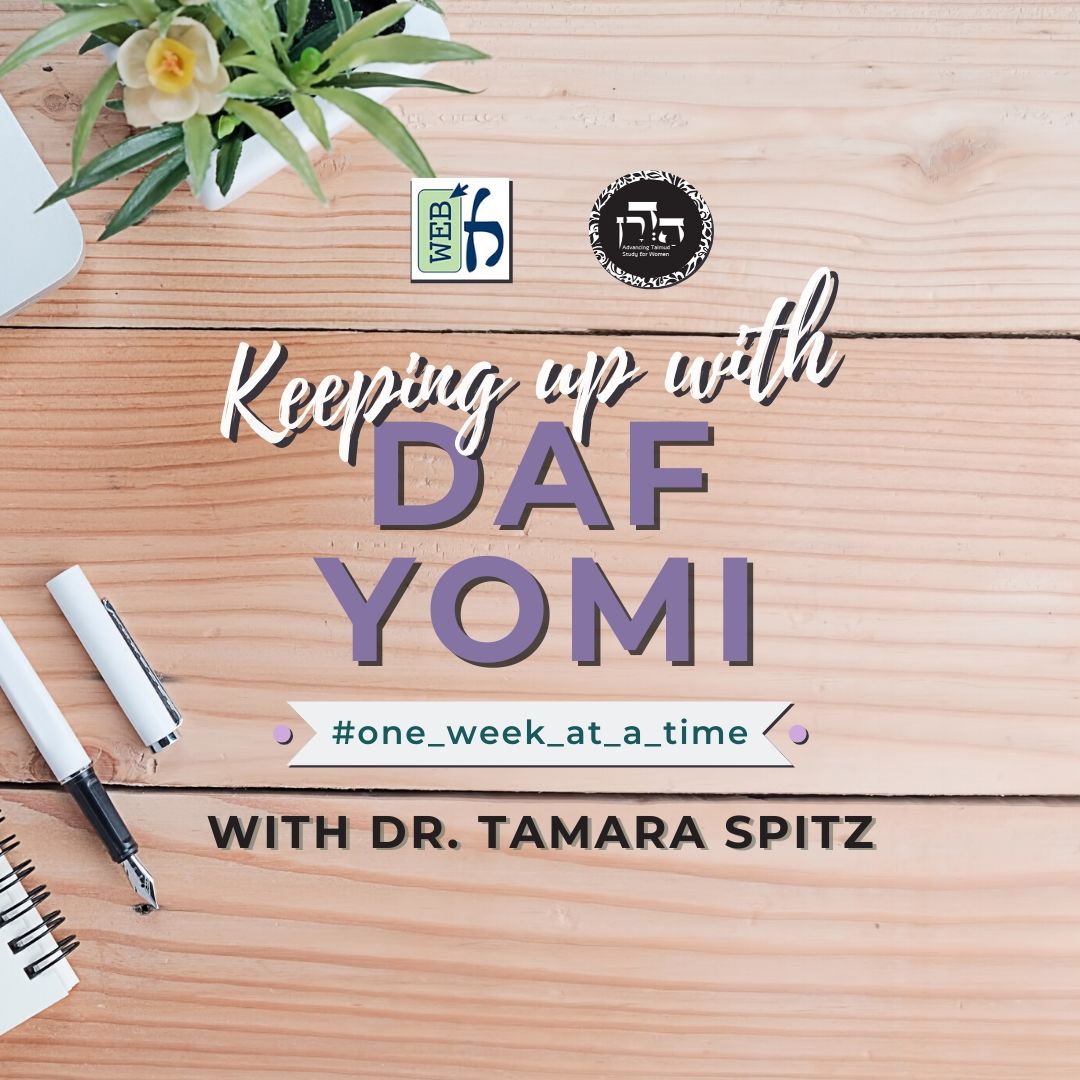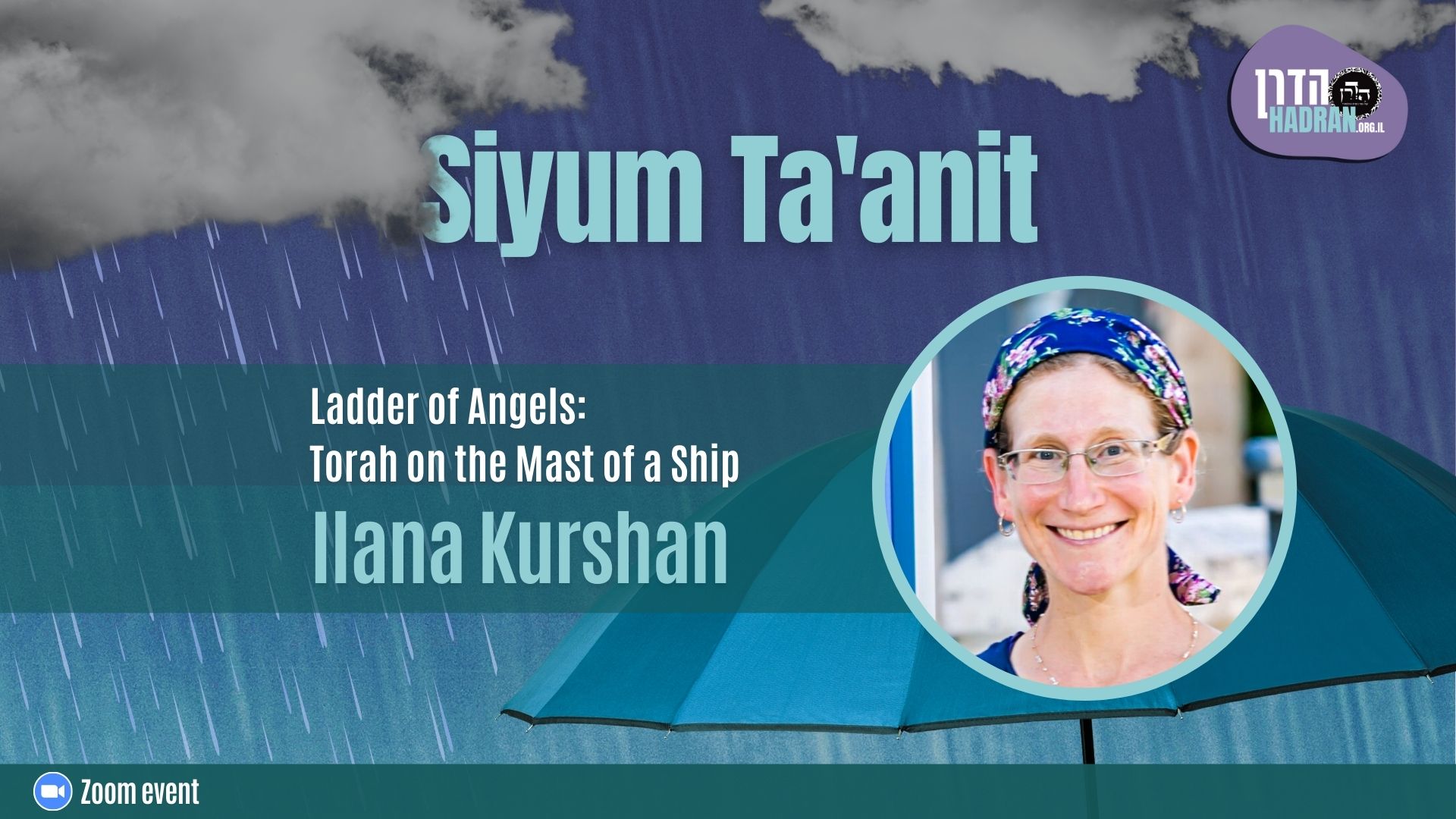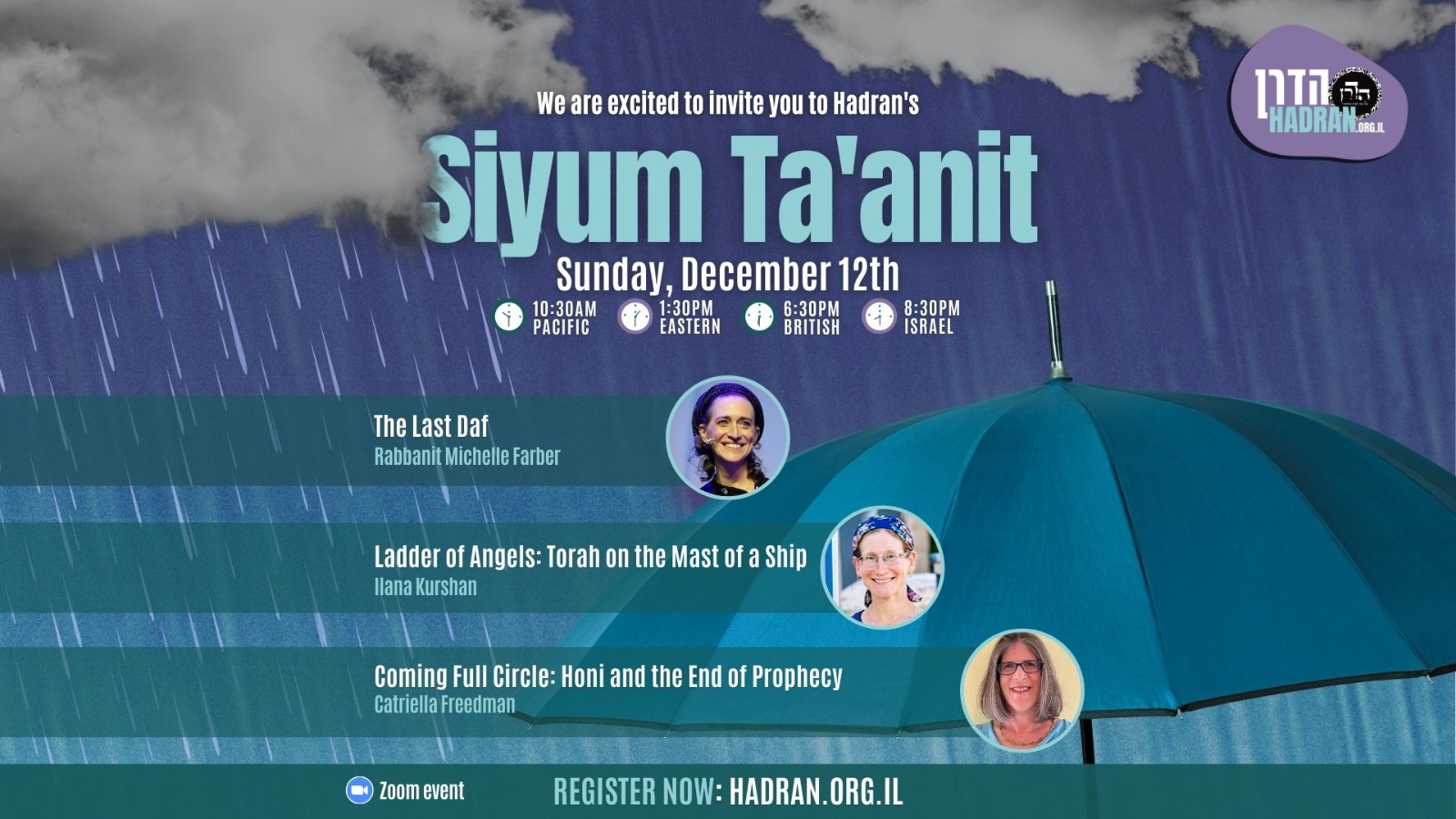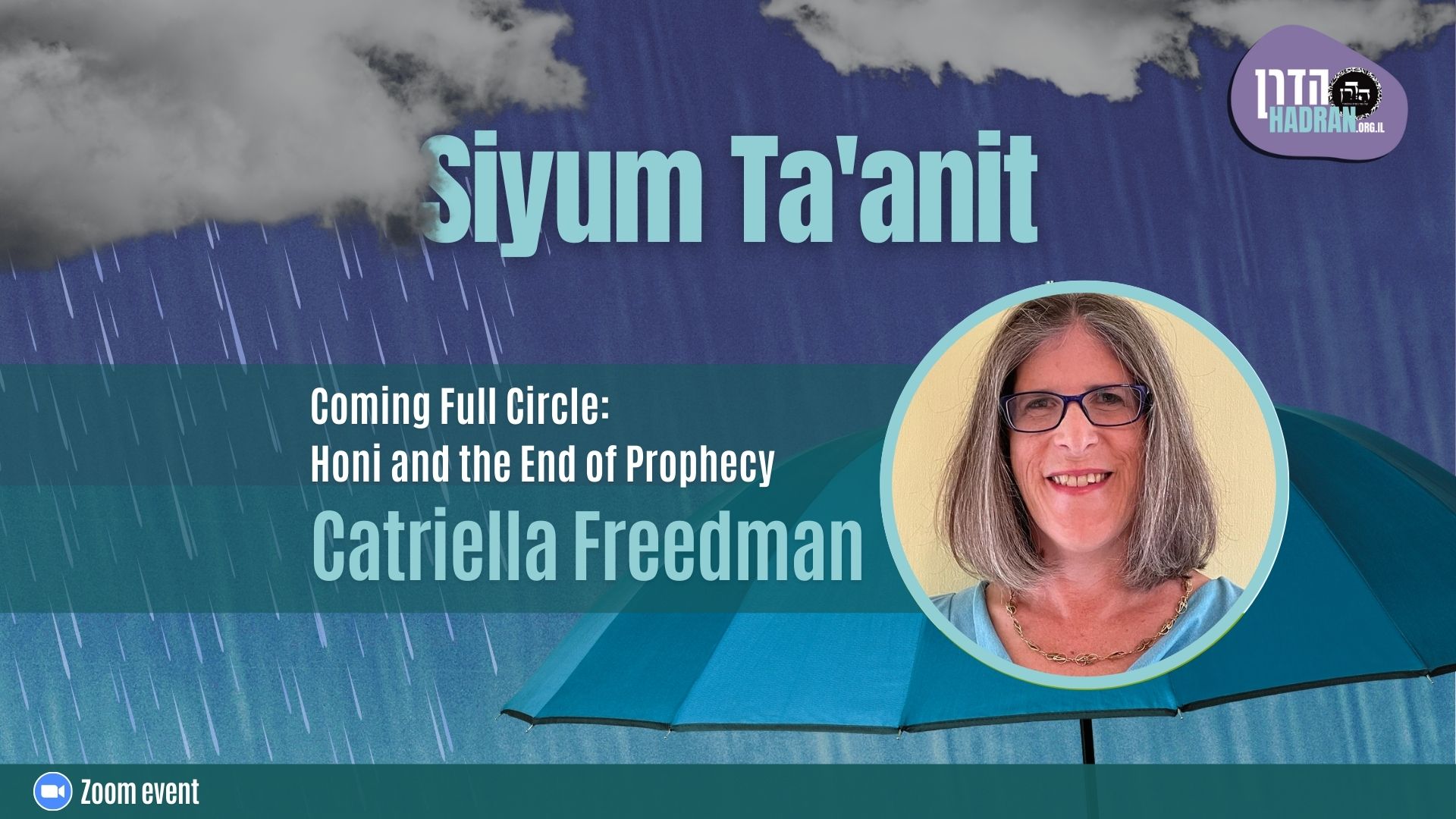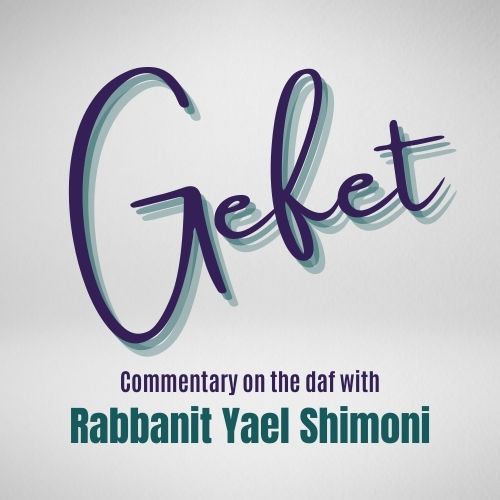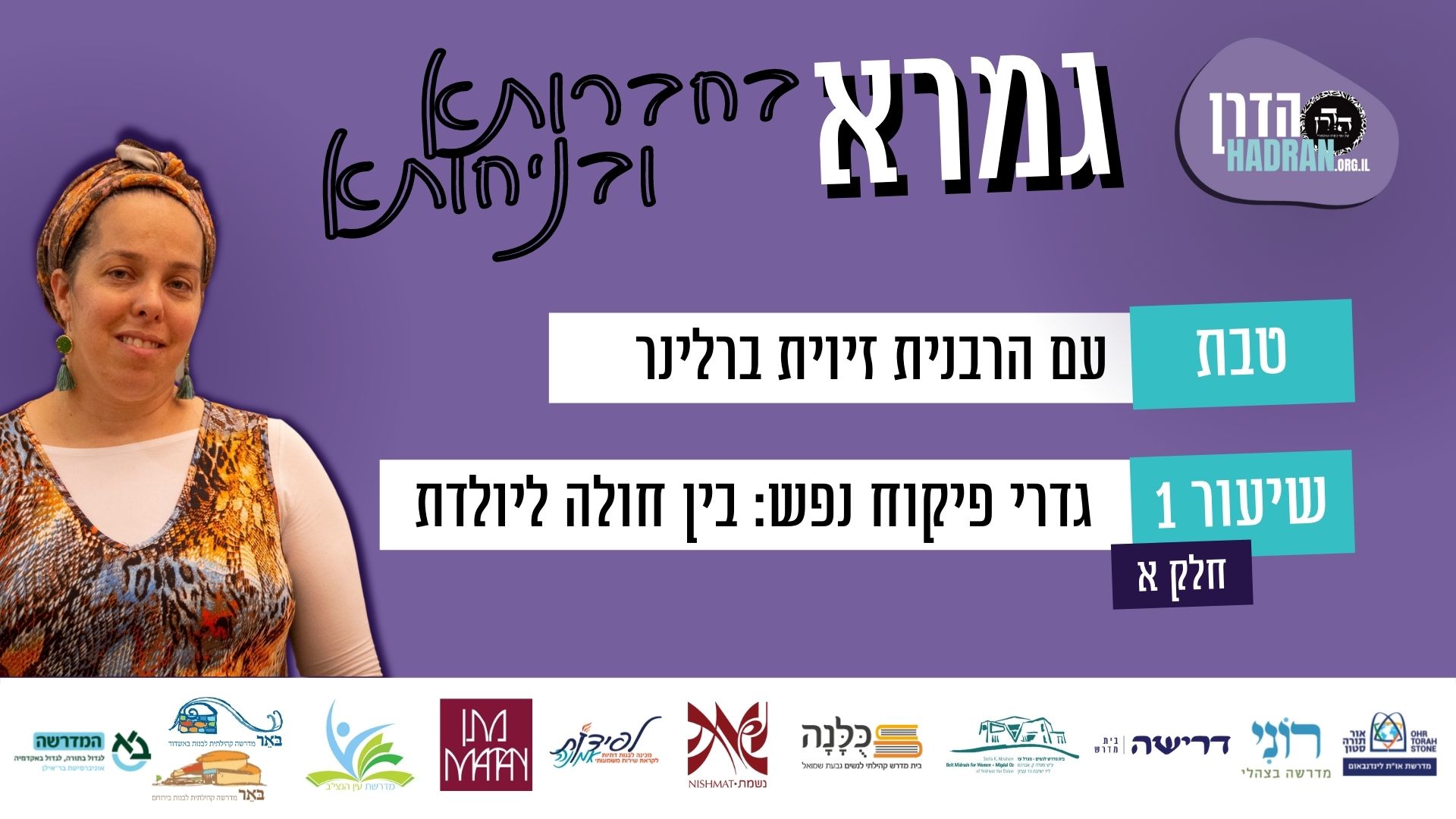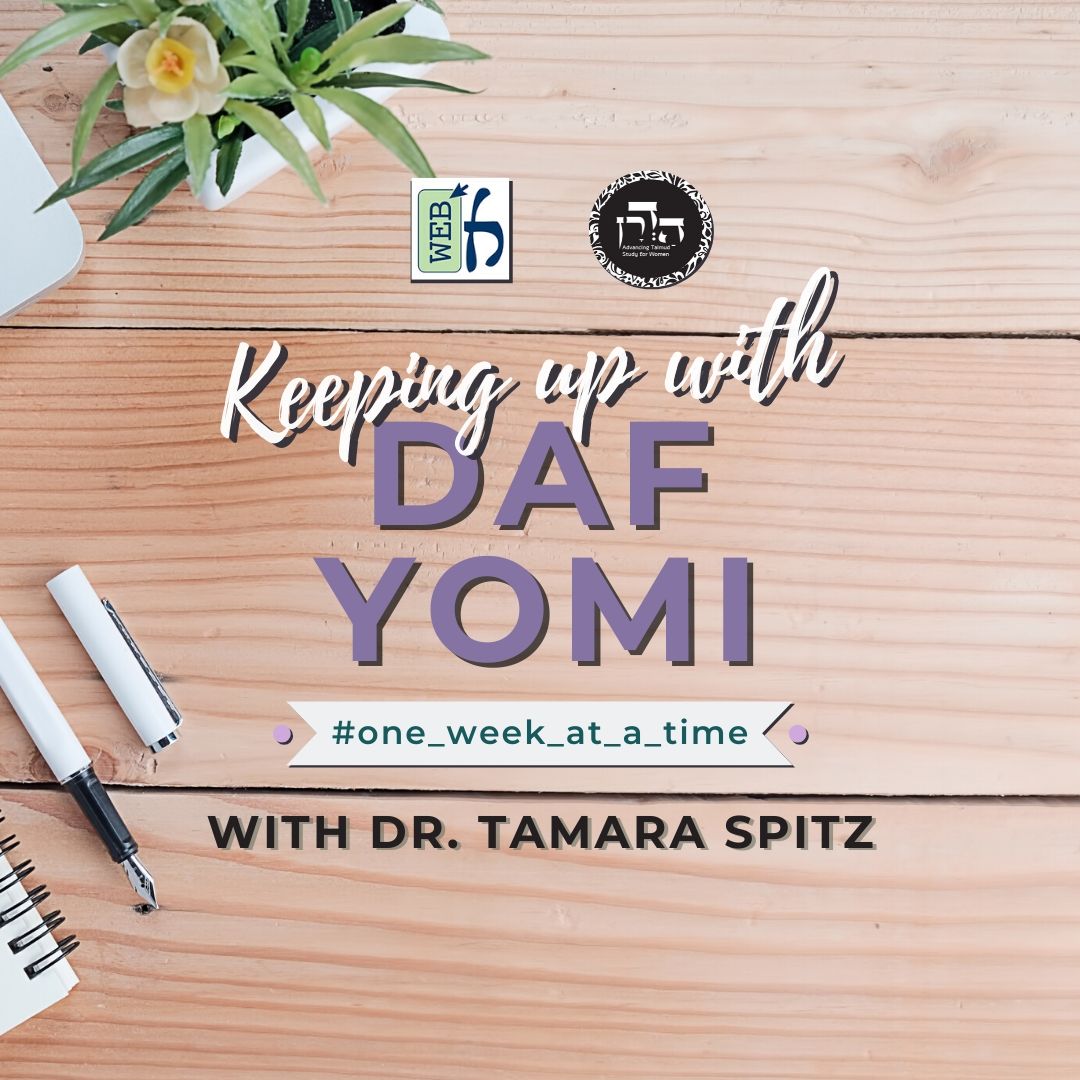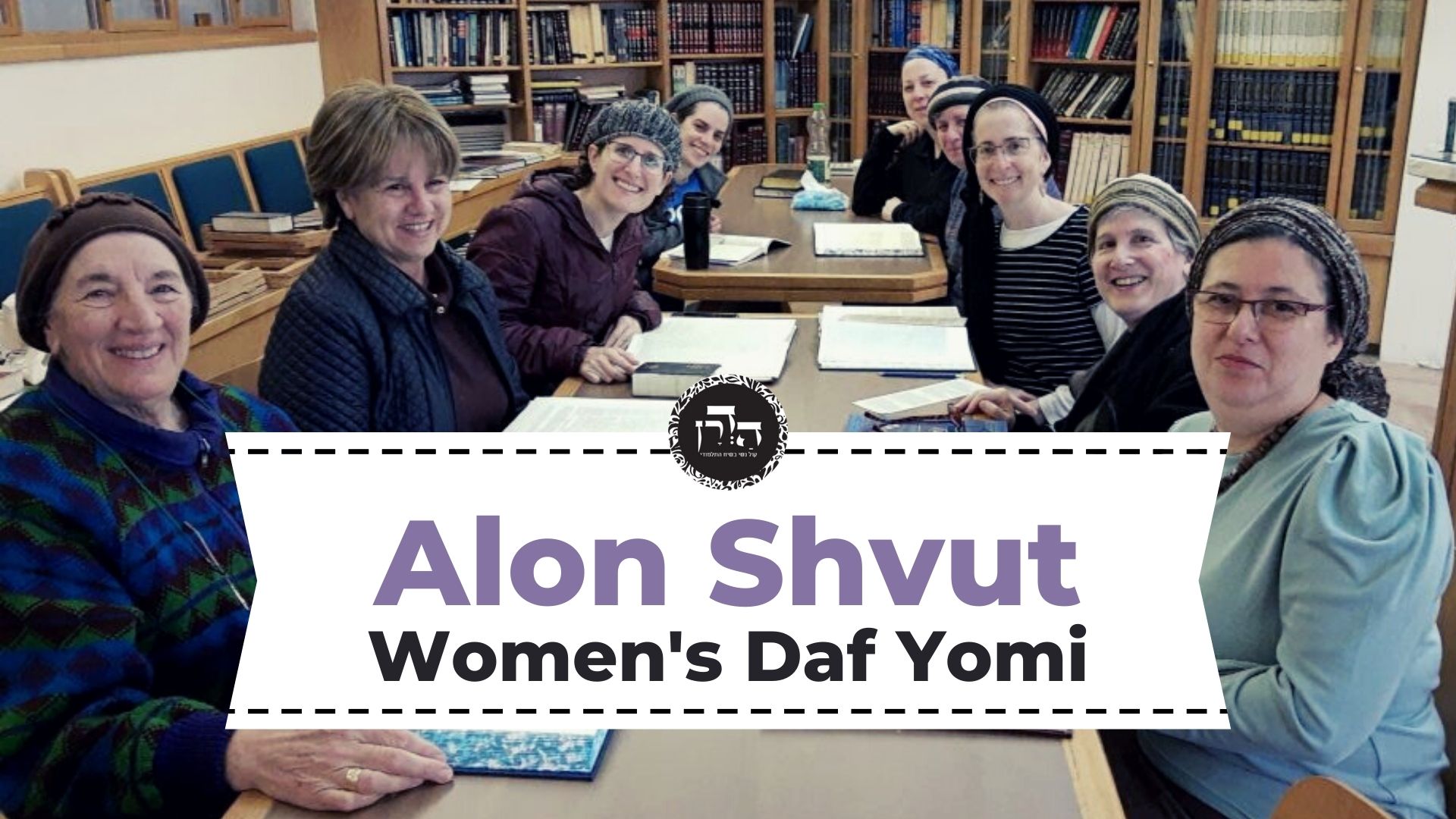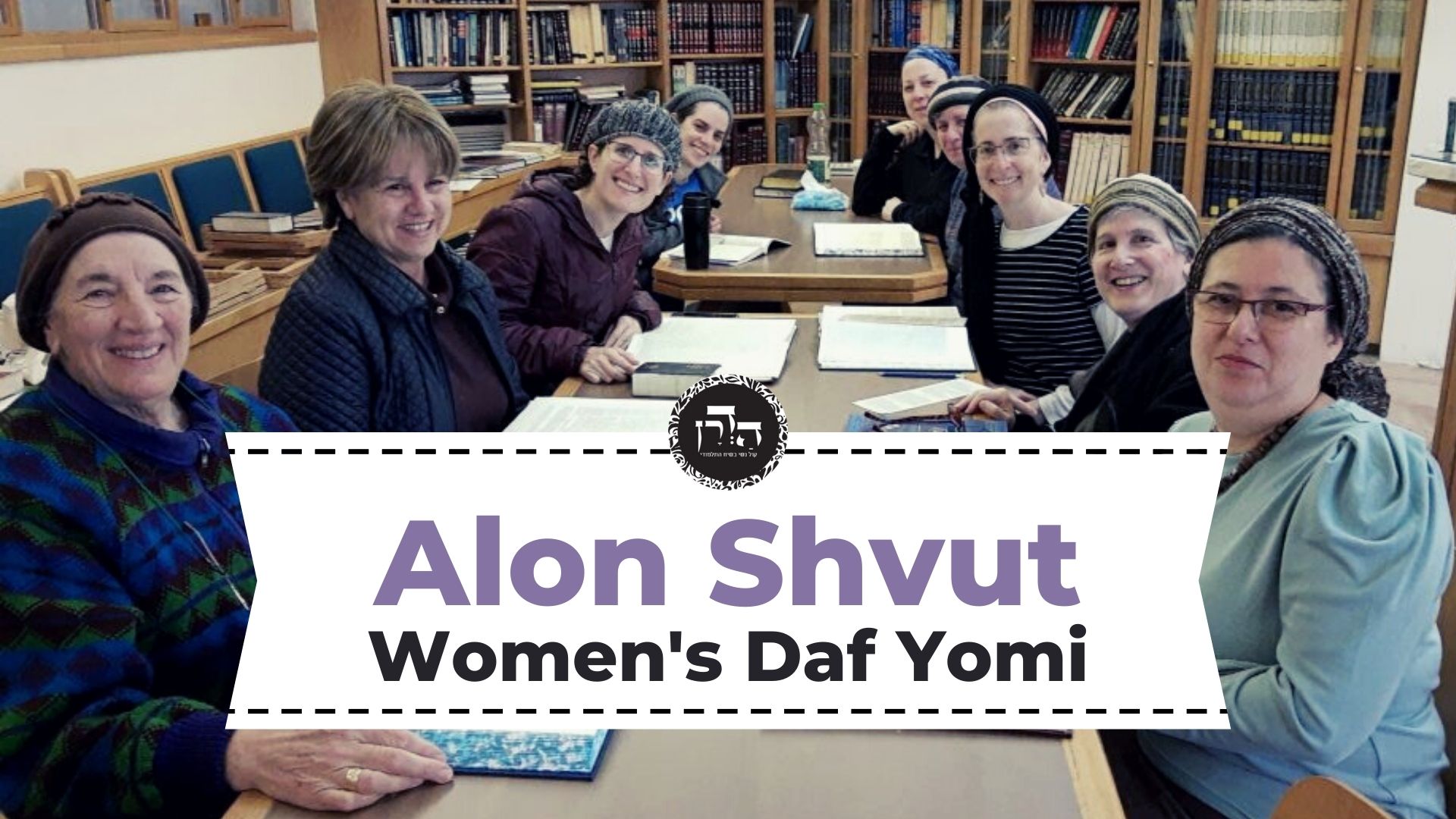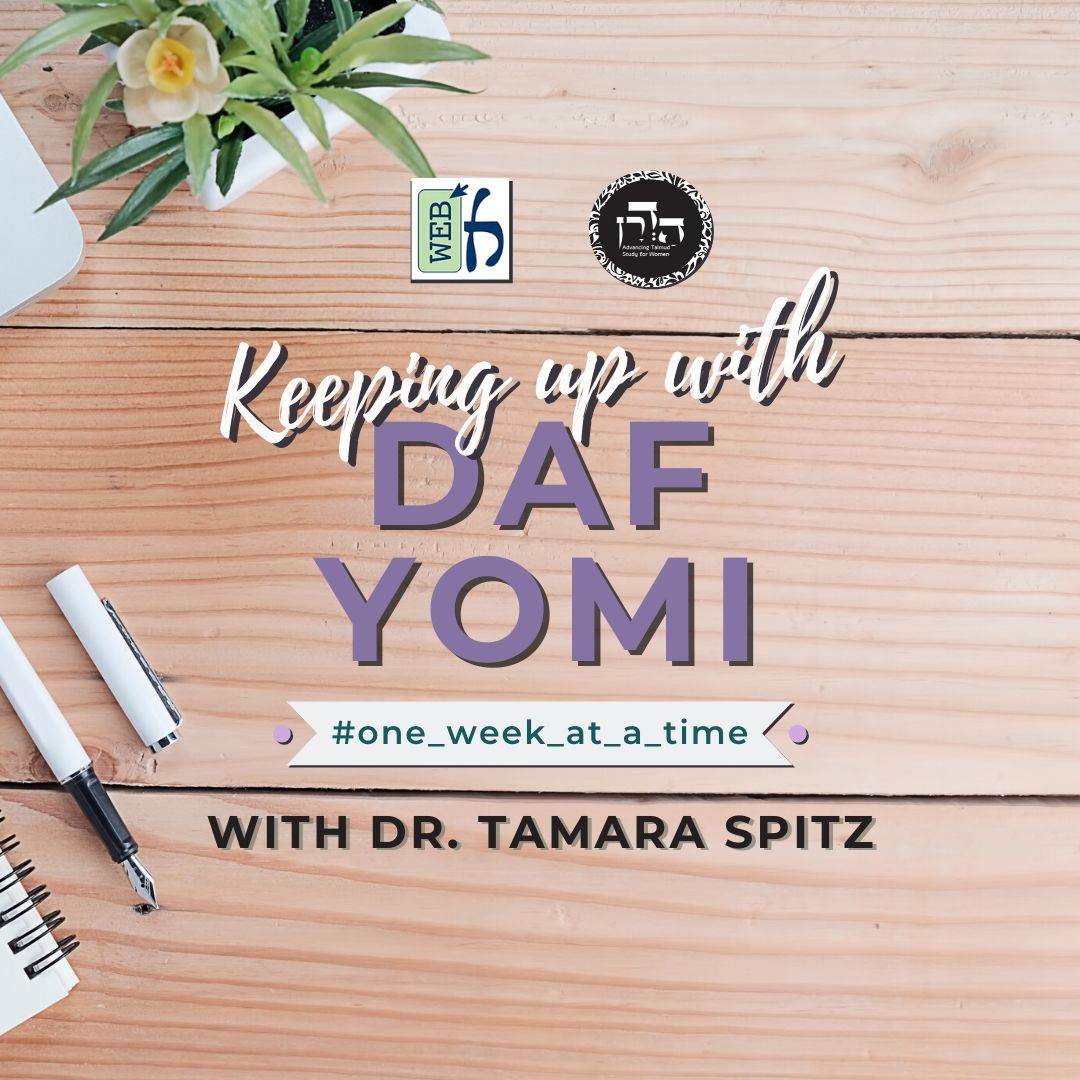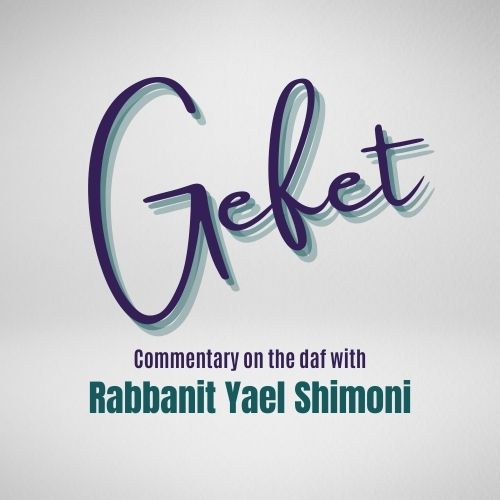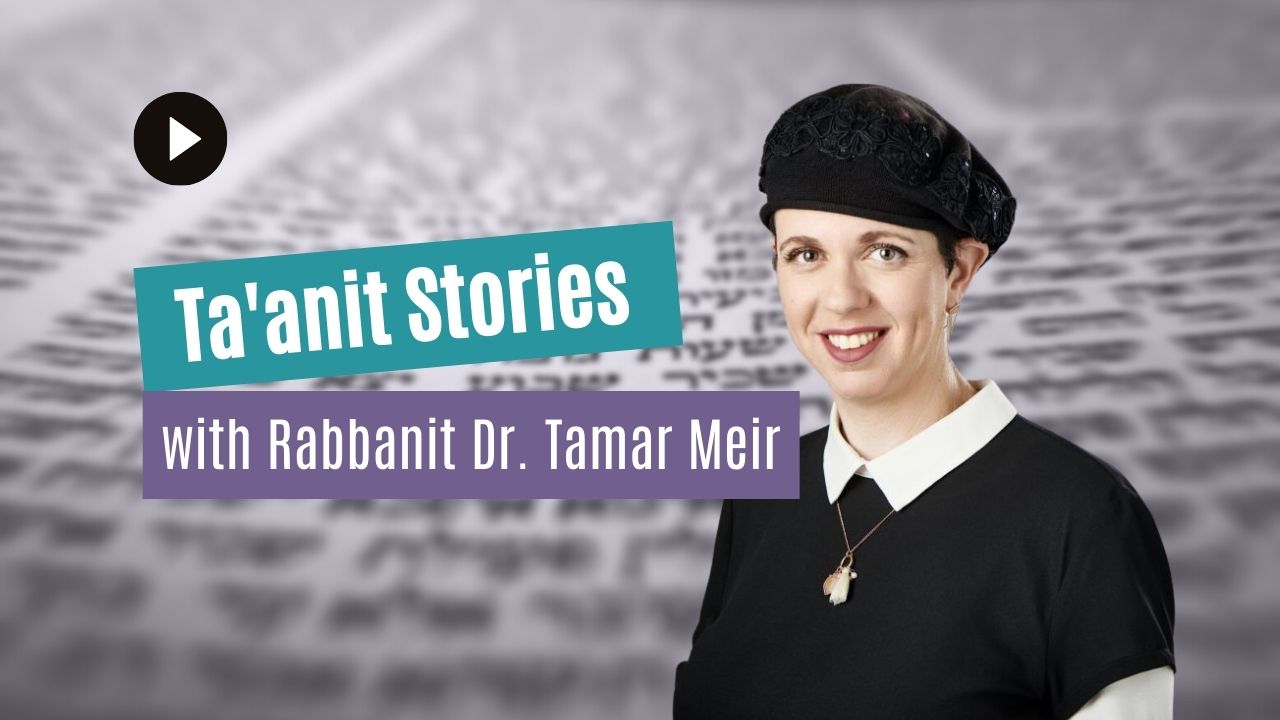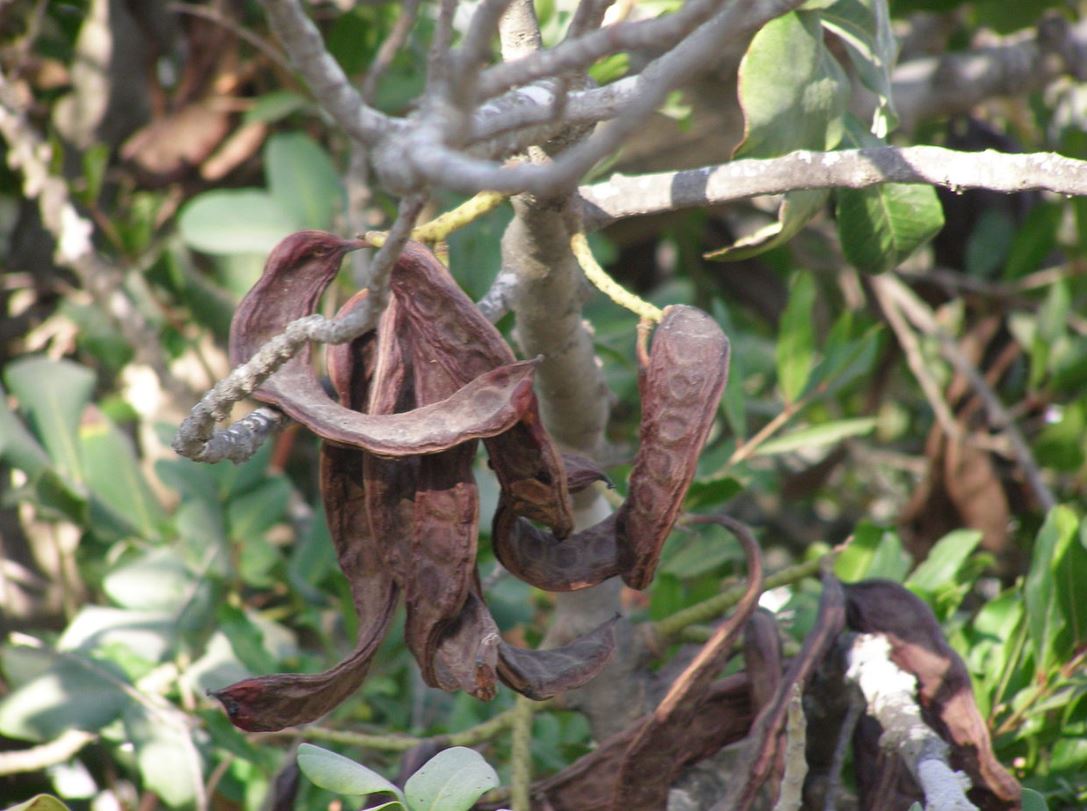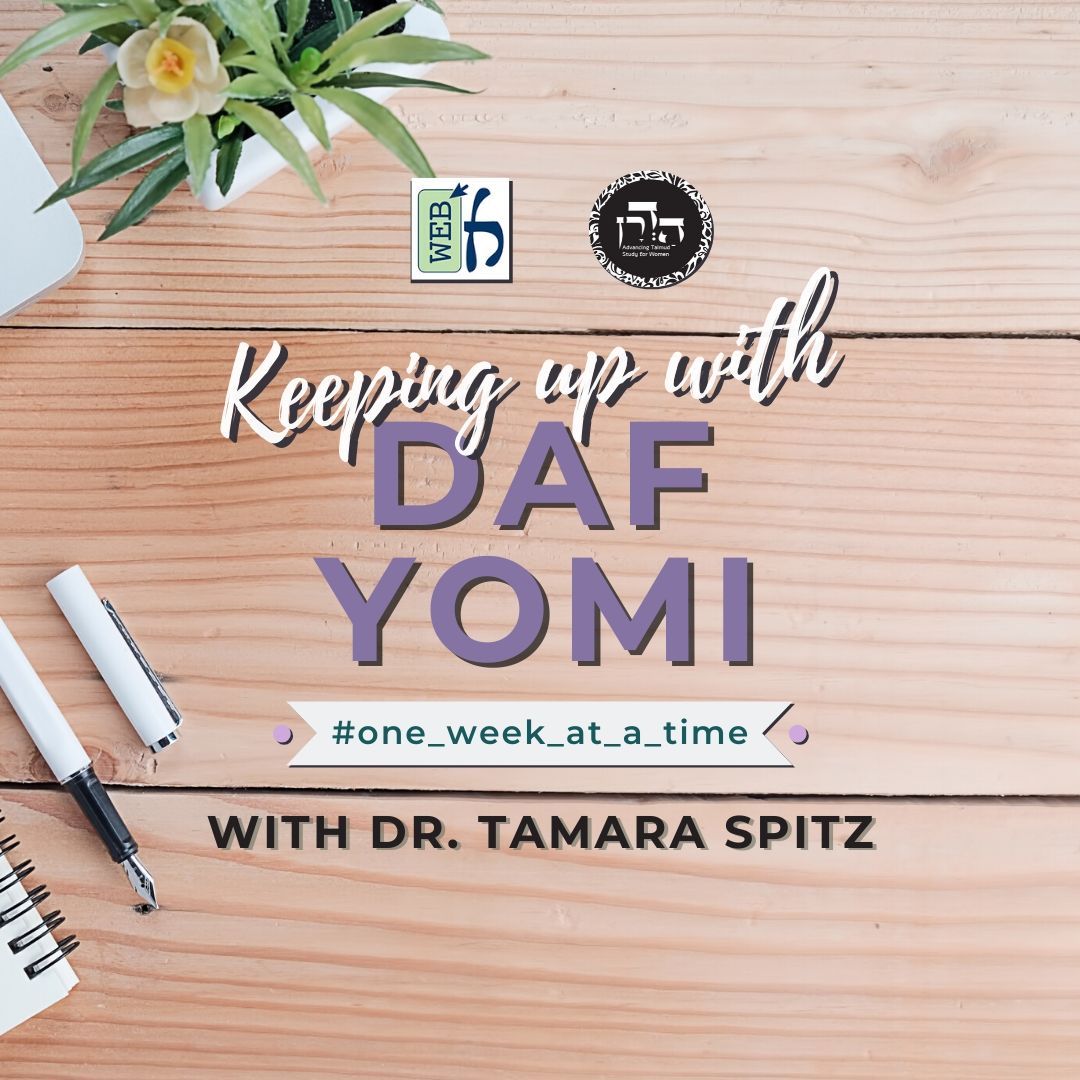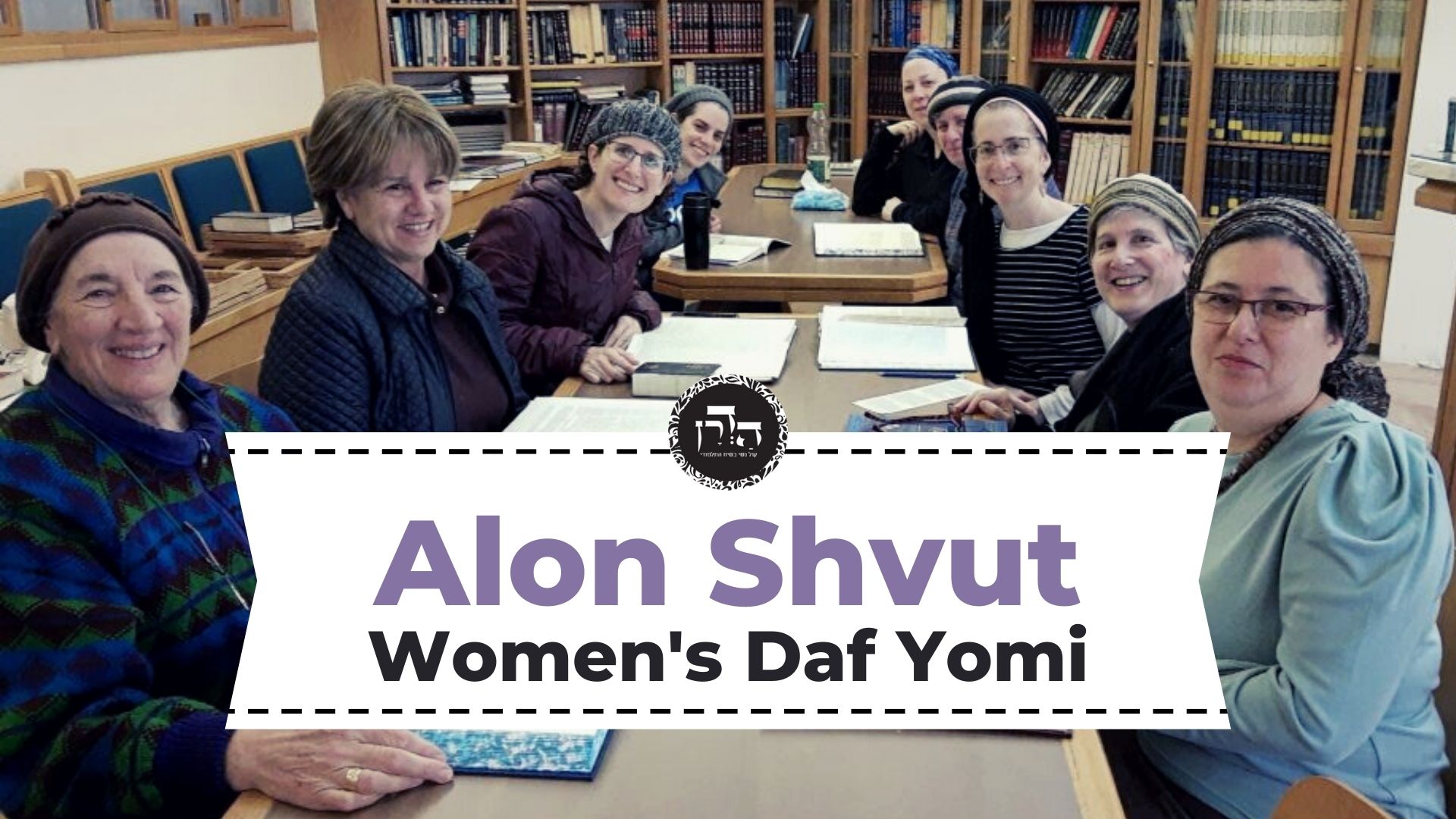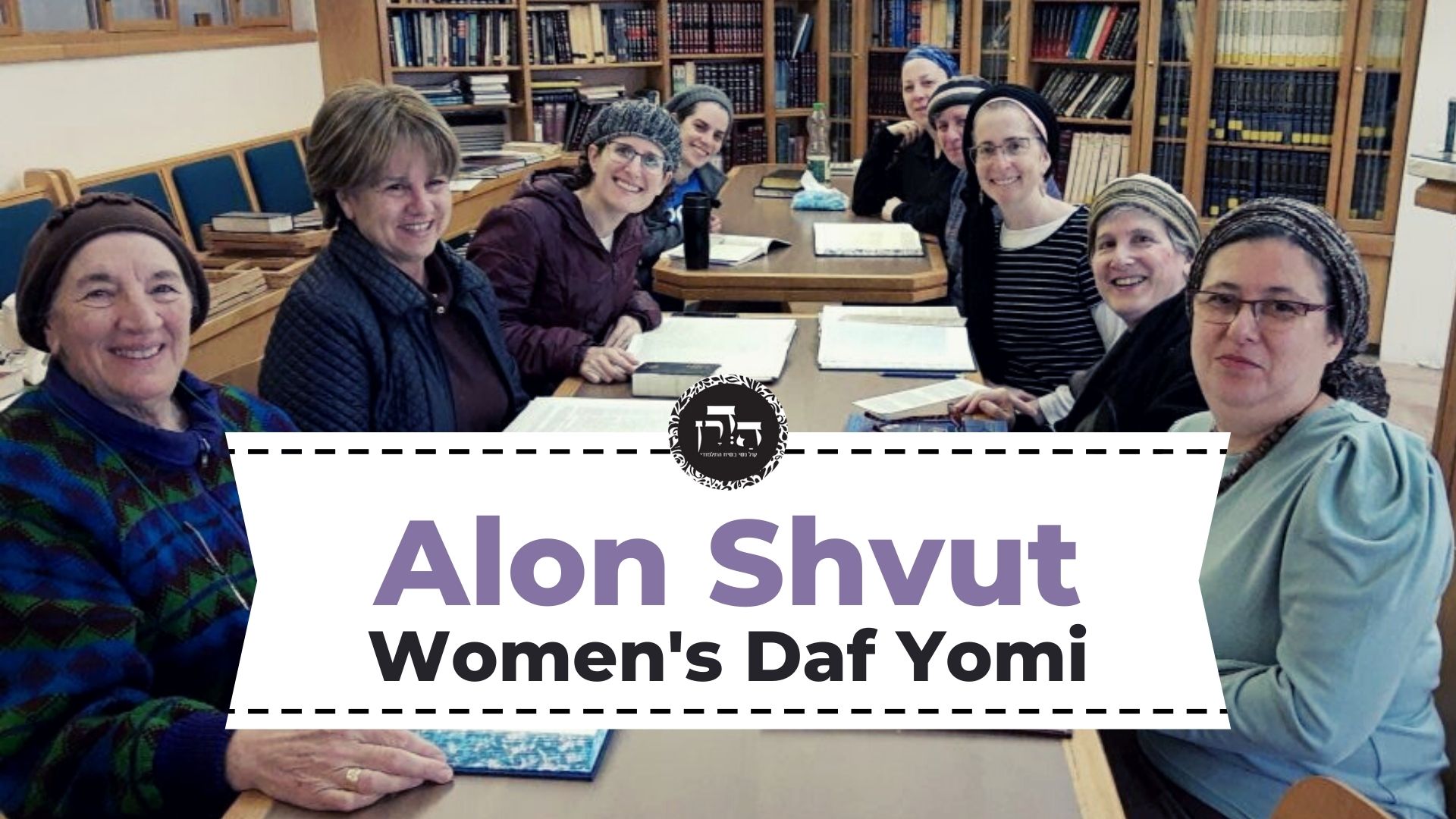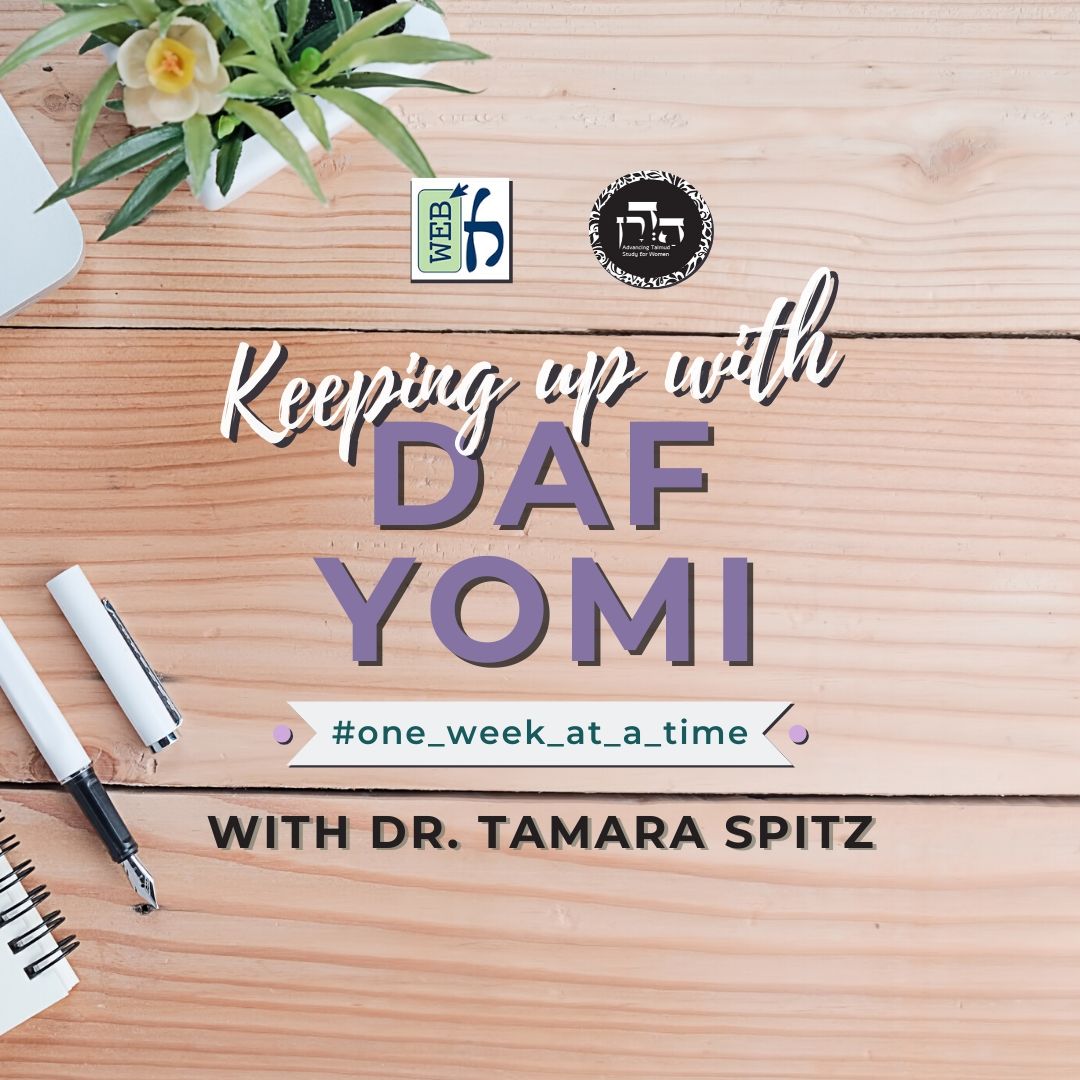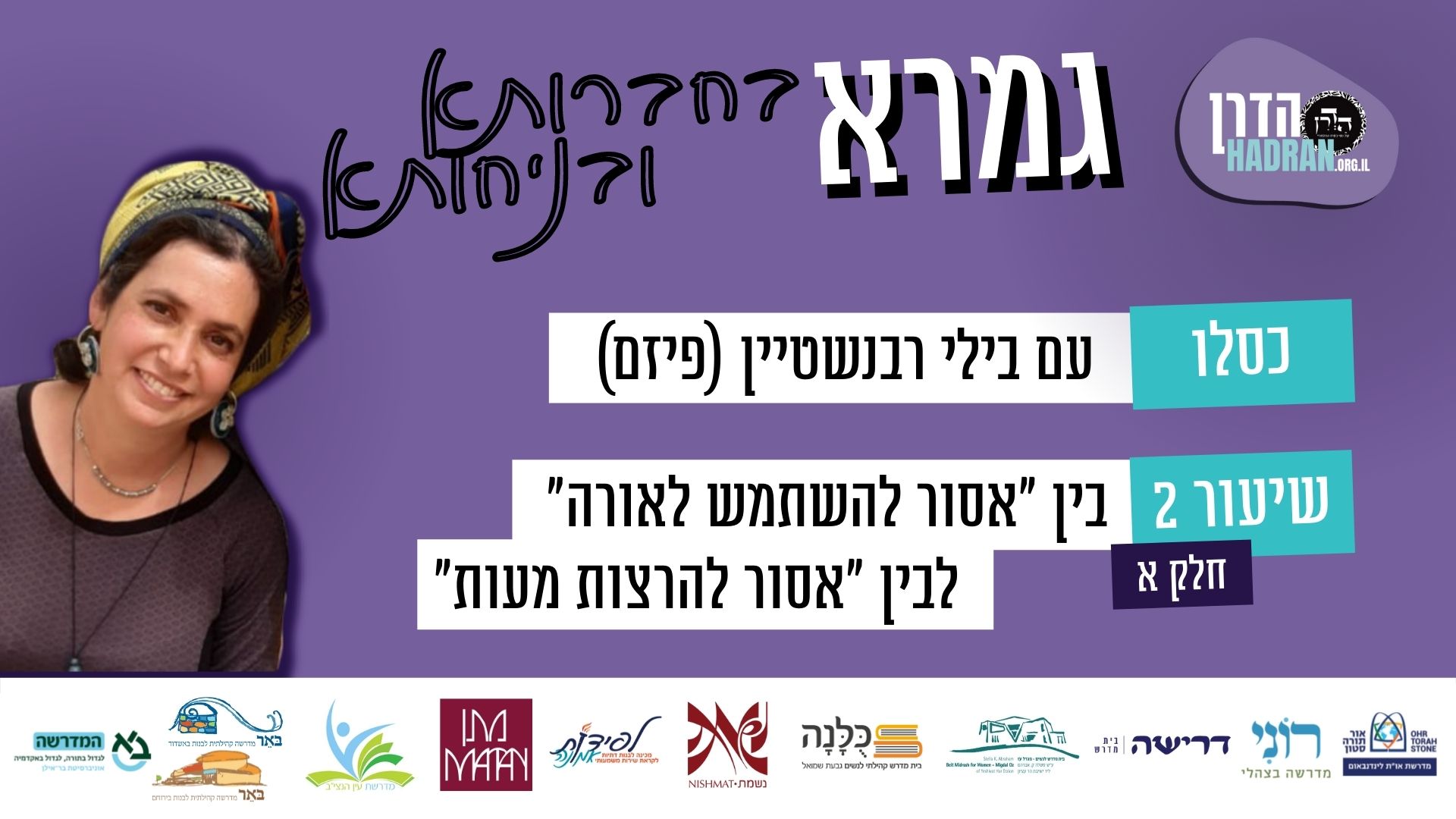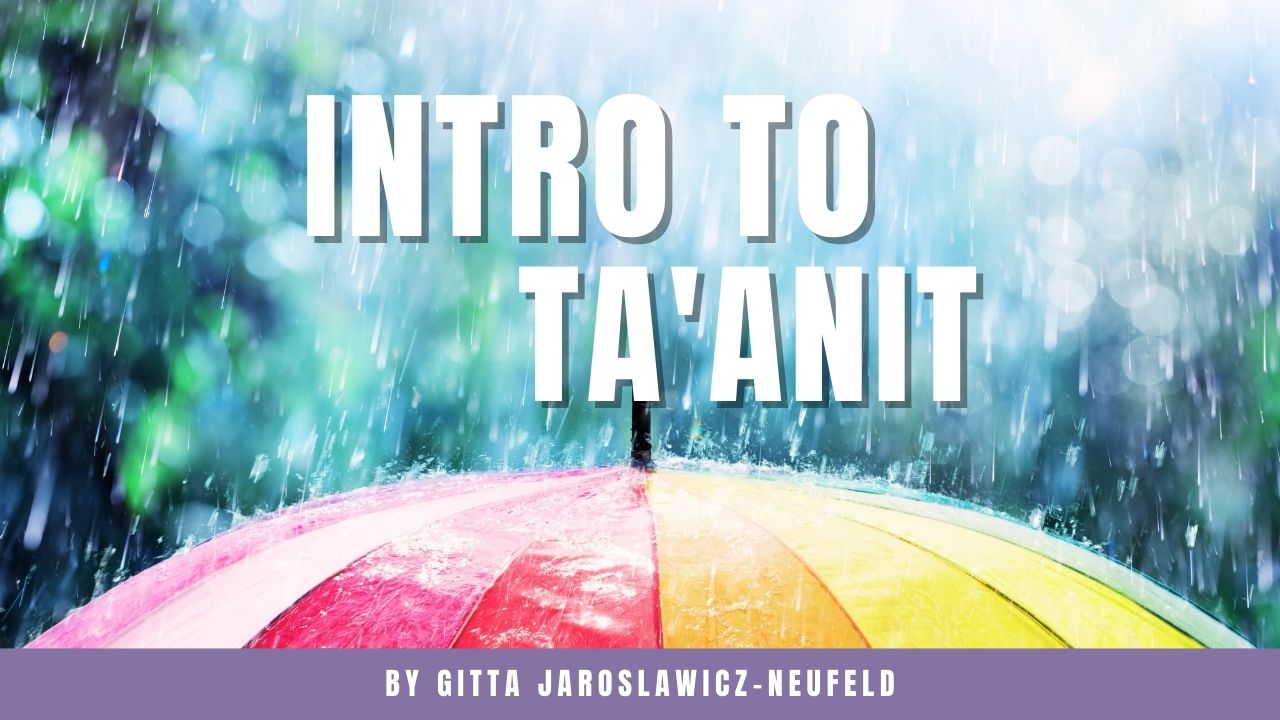Taanit 28
Share this shiur:
Want to dedicate learning? Get started here:


Summary
In which prayers of the maamadot would they read the Torah from a Torah scroll and in which would they read it by heart in the way they recited Shema. This depends on how to punctuate a line in the Mishna. Why are there differences regarding days where they skipped a prayer or more than one prayer of the maamadot between a day when there is Musaf and a day where there is a wood sacrifice? Why would they bring wood sacrifices? Who are the people mentioned in the Mishna by the name of those who deceived with a pestle and those who packed dried figs? These were people who were able to trick the authorities who didn’t allow the Jews to bring wood and their first fruits to the Temple. Also, the Bnei Salmai did something similar to sneak in wood. Who were Pechat Moav ben Yehuda and Adin ben Yehuda – some say they were descendants of David and some say from Yoav ben Tzruya, David’s nephew. According to which opinion does our Mishna hold? Mar Kashisha asks Rav Ashi why does Musaf not override only its maamad, as with Hallel which only overrides the morning service? Rav Ashi answers that Rabbi Yosi holds that way. The Mishna mentions the first of Tevet as a day that has all three – Hallel, musaf and wood sacrifice. What about the first of Nissan as well? It is inferred from here that Hallel on Rosh Chodesh is only a custom and that is why certain sections are omitted. On what days is Hallel recited by law? What was the order of events/dates from the receiving the Torah that would have the 17th of Tamuz be the day the tablets were broken? The Tamid sacrifice was canceled on 17 of Tamuz – that is learned by tradition. The city walls were breached on 17 Tamuz – wasn’t it on the 9th according to the book of Yimriyahu (Jeremiah)? It must be referring to the Second Temple. From where do we derive that the Torah was burned on that day as well and an idol was placed in the Temple?
Today’s daily daf tools:
Today’s daily daf tools:
Delve Deeper
Broaden your understanding of the topics on this daf with classes and podcasts from top women Talmud scholars.
New to Talmud?
Check out our resources designed to help you navigate a page of Talmud – and study at the pace, level and style that fits you.
The Hadran Women’s Tapestry
Meet the diverse women learning Gemara at Hadran and hear their stories.
Taanit 28
דְּאִית לֵיהּ רַוְוחָא.
as the second reader has space, i.e., he has the option to read from the ensuing paragraph.
פָּרָשָׁה גְּדוֹלָה קוֹרִין אוֹתָהּ בִּשְׁנַיִם בַּשַּׁחֲרִית וּבַמּוּסָף. וּבַמִּנְחָה קוֹרִין עַל פִּיהֶן כּוּ׳. אִיבַּעְיָא לְהוּ: הֵיכִי קָאָמַר? בַּשַּׁחֲרִית וּבַמּוּסָף קוֹרִין אוֹתָהּ בַּסֵּפֶר, וּבַמִּנְחָה קוֹרִין אוֹתָהּ עַל פֶּה כְּקוֹרִין אֶת שְׁמַע, אוֹ דִלְמָא הָכִי קָתָנֵי: בַּשַּׁחֲרִית קוֹרִין אוֹתָהּ בַּסֵּפֶר, וּבַמּוּסָף וּבַמִּנְחָה קוֹרִין אוֹתָהּ עַל פֶּה כְּקוֹרִין אֶת שְׁמַע?
§ The mishna taught: A long passage is read by two people, and they read from the Torah in the morning prayer and in the additional prayer. And in the afternoon prayer they read the daily portion by heart, just as one recites Shema. A dilemma was raised before the Sages: With regard to what case is the tanna speaking? Does he mean that in the morning prayer and in the additional prayer they read the portion from a Torah scroll, but in the afternoon prayer each individual reads by heart, just as one recites Shema? Or perhaps this is what is taught: In the morning prayer they read it from a Torah scroll, but in the additional prayer and in the afternoon prayer they read it by heart, just as one recites Shema.
תָּא שְׁמַע, דְּתַנְיָא: בַּשַּׁחֲרִית וּבַמּוּסָף נִכְנָסִין לְבֵית הַכְּנֶסֶת וְקוֹרִין כְּדֶרֶךְ שֶׁקּוֹרִין כׇּל הַשָּׁנָה, וּבַמִּנְחָה יָחִיד קוֹרֵא אוֹתָהּ עַל פֶּה. אֲמַר רַבִּי יוֹסֵי: וְכִי יָחִיד יָכוֹל לִקְרוֹת דִּבְרֵי תוֹרָה עַל פֶּה בְּצִיבּוּר? אֶלָּא כּוּלָּן נִכְנָסִין וְקוֹרִין אוֹתָהּ עַל פֶּה כְּקוֹרִין אֶת שְׁמַע.
The Gemara suggests: Come and hear, as it is taught in a baraita: In the morning prayer and in the additional prayer they would enter the synagogue and read from the Torah in the manner that they read all year. But in the afternoon prayer, a single individual would read the portion for that day by heart. Rabbi Yosei said: But can an individual read matters of Torah by heart in the presence of the community? Rather, they all enter and read that day’s portion together, just as one recites Shema. This baraita clearly indicates that they would read by heart only in the afternoon service.
כׇּל יוֹם שֶׁיֵּשׁ בּוֹ הַלֵּל אֵין בּוֹ מַעֲמָד כּוּ׳. מָה הֶפְרֵשׁ בֵּין זֶה לָזֶה? הַלָּלוּ דִּבְרֵי תוֹרָה, וְהַלָּלוּ דִּבְרֵי סוֹפְרִים.
The mishna taught: On any day that has the recitation of hallel, but on which the additional offering was not sacrificed, it has no reading of the Torah by the non-priestly watch in the morning service. On days that have both hallel and an additional offering, there was no reading in the afternoon prayer. When a wood offering was brought, there was no reading in the closing prayer. The Gemara asks: What is the difference between this and that, a day on which an additional offering is sacrificed and a day on which a wood offering is brought? The Gemara explains: These days, on which an additional offering is brought, apply by Torah law, but these days, on which a wood offering is brought, apply by rabbinic law, and therefore it overrides only the closing prayer.
זְמַן עֲצֵי כֹהֲנִים וְהָעָם כּוּ׳. תָּנוּ רַבָּנַן: לָמָּה הוּצְרְכוּ לוֹמַר זְמַן עֲצֵי כֹהֲנִים וְהָעָם? אָמְרוּ: כְּשֶׁעָלוּ בְּנֵי הַגּוֹלָה לֹא מָצְאוּ עֵצִים בַּלִּשְׁכָּה, וְעָמְדוּ אֵלּוּ וְהִתְנַדְּבוּ מִשֶּׁלָּהֶם.
The mishna continues with a list of the times for the wood offering of priests and the people. The Sages taught: Why was it necessary to state the times for the wood offering of priests and the people? They said in response that this is what happened: When the people of the exile ascended to Jerusalem in the beginning of the Second Temple period, they did not find enough wood in the Temple chamber for the needs of the altar. And these families arose and donated from their own wood to the Temple.
וְכָךְ הִתְנוּ נְבִיאִים שֶׁבֵּינֵיהֶן: שֶׁאֲפִילּוּ לִשְׁכָּה מְלֵאָה עֵצִים יִהְיוּ אֵלּוּ מִתְנַדְּבִין מִשֶּׁלָּהֶן, שֶׁנֶּאֱמַר: ״וְהַגּוֹרָלוֹת הִפַּלְנוּ עַל קֻרְבַּן הָעֵצִים הַכֹּהֲנִים הַלְוִיִּם וְהָעָם לְהָבִיא לְבֵית אֱלֹהֵינוּ לְבֵית אֲבוֹתֵינוּ לְעִתִּים מְזֻמָּנִים שָׁנָה בְשָׁנָה לְבַעֵר עַל מִזְבַּח ה׳ אֱלֹהֵינוּ כַּכָּתוּב בַּתּוֹרָה״.
And the prophets among them stipulated as follows, that even if the entire chamber were full of wood, the descendants of these families would donate wood from their own property on these specific days, as it is stated: “And we cast lots, the priests, the Levites and the people, for the wood offering, to bring it into the house of our God, according to our fathers’ houses, at appointed times year by year, to burn upon the altar of the Lord our God, as it is written in the Torah” (Nehemiah 10:35). Although these donations were not always necessary, it was established that all generations would observe these days.
וְעִמָּהֶם כֹּהֲנִים וּלְוִיִּם וְכׇל מִי כּוּ׳. תָּנוּ רַבָּנַן: מָה הָיוּ בְּנֵי גּוֹנְבֵי עֱלִי וּבְנֵי קוֹצְעֵי קְצִיעוֹת?
The mishna further taught that on the fifteenth of Av, wood was brought by the descendants of Zattu ben Yehuda, and with this group were other priests and Levites, and anyone who erred with regard to his tribe, i.e., Israelites who did not know which tribe they were from, and the descendants of those who deceived the authorities with a pestle, and the descendants of those who packed dried figs. The Sages taught: Who were the descendants of those who deceived the authorities with a pestle and the descendants of those who packed dried figs?
אָמְרוּ: פַּעַם אַחַת גָּזְרָה מַלְכוּת הָרְשָׁעָה שְׁמָד עַל יִשְׂרָאֵל שֶׁלֹּא יָבִיאוּ עֵצִים לַמַּעֲרָכָה, וְשֶׁלֹּא יָבִיאוּ בִּכּוּרִים לִירוּשָׁלַיִם, וְהוֹשִׁיבוּ פְּרוֹזְדָאוֹת עַל הַדְּרָכִים כְּדֶרֶךְ שֶׁהוֹשִׁיב יָרׇבְעָם בֶּן נְבָט, שֶׁלֹּא יַעֲלוּ יִשְׂרָאֵל לָרֶגֶל.
They said in explanation: Once, the evil kingdom of Greece issued a decree of apostasy against the Jews, that they may not bring wood for the arrangement of the altar and that they may not bring first fruits to Jerusalem. And they placed guards [prozda’ot] on the roads, in the manner that Jeroboam, son of Nevat, placed guards, so that the Jews could not ascend for the pilgrim Festival.
מָה עָשׂוּ כְּשֵׁרִין וְיִרְאֵי חֵטְא שֶׁבְּאוֹתוֹ הַדּוֹר? הֵבִיאוּ סַלֵּי בִכּוּרִים וְחִיפּוּם בִּקְצִיעוֹת וּנְטָלוּם, וֶעֱלִי עַל כִּתְפֵיהֶן. וְכֵיוָן שֶׁהִגִּיעוּ אֵצֶל פְּרוֹזְדָאוֹת, אָמְרוּ לָהֶם: לְהֵיכָן אַתֶּם הוֹלְכִין? אוֹמְרִין לָהֶם: לַעֲשׂוֹת שְׁנֵי עִגּוּלֵי דְבֵילָה בַּמַּכְתֶּשֶׁת שֶׁלְּפָנֵינוּ, וּבָעֱלִי שֶׁעַל כְּתֵפֵינוּ. כֵּיוָן שֶׁעָבְרוּ מֵהֶן — עִיטְּרוּם בְּסַלִּים, וֶהֱבִיאוּם לִירוּשָׁלַיִם.
What did the worthy and sin-fearing individuals of that generation do? They brought baskets of first fruits, and covered them with dried figs, and took them with a pestle on their shoulders. And when they reached the guards, the guards said to them: Where are you going? They said to them: We are going to prepare two round cakes of pressed figs with the mortar that is down the road before us and with the pestle that we are carrying on our shoulders. As soon as they passed the guards, they decorated the baskets of first fruits and brought them to Jerusalem.
תָּנָא: הֵן הֵן בְּנֵי סַלְמַאי הַנְּתוֹפָתִי. תָּנוּ רַבָּנַן: מָה הֵן בְּנֵי סַלְמַאי הַנְּתוֹפָתִי? אָמְרוּ: פַּעַם אַחַת גָּזְרָה מַלְכוּת הָרְשָׁעָה שְׁמָד עַל יִשְׂרָאֵל שֶׁלֹּא יָבִיאוּ עֵצִים לַמַּעֲרָכָה, וְהוֹשִׁיבוּ פְּרוֹזְדָאוֹת עַל הַדְּרָכִים כְּדֶרֶךְ שֶׁהוֹשִׁיב יָרׇבְעָם בֶּן נְבָט עַל הַדְּרָכִים, שֶׁלֹּא יַעֲלוּ יִשְׂרָאֵל לָרֶגֶל.
A Sage taught: This was something that was performed in a similar manner by the descendants of Salmai of Netophat. The Gemara explains this comment by quoting a baraita. The Sages taught: Who are the descendants of Salmai of Netophat? They said in explanation: Once, the evil kingdom of Greece issued a decree of apostasy against the Jews, that they may not bring wood for the arrangement of the altar. And they placed guards on the roads, in the manner that Jeroboam, son of Nevat, placed guards, so that the Jews could not ascend for the pilgrim Festival.
מָה עָשׂוּ יִרְאֵי חֵטְא שֶׁבְּאוֹתוֹ הַדּוֹר? הֵבִיאוּ גְּזִירֵיהֶן וְעָשׂוּ סוּלָּמוֹת, וְהִנִּיחוּ עַל כִּתְפֵיהֶם וְהָלְכוּ לָהֶם. כֵּיוָן שֶׁהִגִּיעוּ אֶצְלָן, אָמְרוּ לָהֶם: לְהֵיכָן אַתֶּם הוֹלְכִין? אָמְרוּ לָהֶם: לְהָבִיא גּוֹזָלוֹת מִשּׁוֹבָךְ שֶׁלְּפָנֵינוּ וּבַסּוּלָּמוֹת שֶׁעַל כְּתֵפֵינוּ. כֵּיוָן שֶׁעָבְרוּ מֵהֶן פֵּירְקוּם וֶהֱבִיאוּם וְהֶעֱלוּם לִירוּשָׁלַיִם.
What did the sin-fearing individuals of that generation do? They brought their pieces of wood and prepared ladders [sulamot], and they placed the ladders on their shoulders and went off to Jerusalem. When they reached the guards, the guards said to them: Where are you going? They said to them: We are going to bring down doves from the dovecote that is located down the road before us and with these ladders that are on our shoulders. As soon as they had passed the guards, they dismantled the ladders and took them up to Jerusalem. The name Salmai alludes to the Hebrew word for ladder, sulam.
וַעֲלֵיהֶם וְעַל כַּיּוֹצֵא בָּהֶם הוּא אוֹמֵר: ״זֵכֶר צַדִּיק לִבְרָכָה״, וְעַל יָרׇבְעָם בֶּן נְבָט וַחֲבֵרָיו נֶאֱמַר: ״וְשֵׁם רְשָׁעִים יִרְקָב״.
And about these families who provided these donations and others like them, the verse says: “The memory of the righteous shall be for a blessing” (Proverbs 10:7), as they are remembered for the good throughout the generations. And about Jeroboam, son of Nevat, and his ilk, it is stated: “But the name of the wicked shall rot” (Proverbs 10:7).
בְּעֶשְׂרִים בּוֹ בְּנֵי פַּחַת מוֹאָב בֶּן יְהוּדָה. תָּנָא: בְּנֵי פַּחַת מוֹאָב בֶּן יְהוּדָה — הֵן הֵן בְּנֵי דָוִד בֶּן יְהוּדָה, דִּבְרֵי רַבִּי מֵאִיר. רַבִּי יוֹסֵי אוֹמֵר: הֵן הֵן בְּנֵי יוֹאָב בֶּן צְרוּיָה.
§ The mishna taught: On the twentieth of Av, the wood offering was brought by the descendants of Pahath Moab ben Yehuda. A tanna taught: The descendants of Pahath Moab ben Yehuda are the descendants of David ben Yehuda. He is called Moab because Ruth the Moabite was the grandmother of David’s father, Yishai. This is the statement of Rabbi Meir. Rabbi Yosei says: These are the descendants of Joab, son of Zeruiah, whose mother was the daughter of Yishai and therefore also descended from Ruth.
בְּעֶשְׂרִים בֶּאֱלוּל בְּנֵי עָדִין בֶּן יְהוּדָה וְכוּ׳. תָּנוּ רַבָּנַן: בְּנֵי עָדִין בֶּן יְהוּדָה — הֵן הֵן בְּנֵי דָוִד בֶּן יְהוּדָה, דִּבְרֵי רַבִּי יְהוּדָה. רַבִּי יוֹסֵי אוֹמֵר: הֵן הֵן בְּנֵי יוֹאָב בֶּן צְרוּיָה.
The mishna further taught: On the twentieth of Elul, the descendants of Adin ben Yehuda brought their wood offering. The Sages taught: The descendants of Adin ben Yehuda are the descendants of David ben Yehuda, who was called Adin. This is the statement of Rabbi Yehuda. Rabbi Yosei says: These are the descendants of Joab, son of Zeruiah.
בְּאֶחָד בְּטֵבֵת שָׁבוּ בְּנֵי פַרְעוֹשׁ שְׁנִיָּה כּוּ׳. מַנִּי מַתְנִיתִין? לָא רַבִּי מֵאִיר, וְלָא רַבִּי יְהוּדָה, וְלָא רַבִּי יוֹסֵי. אִי רַבִּי מֵאִיר, לִיתְנֵי: שָׁבוּ בְּנֵי דָוִד בֶּן יְהוּדָה שְׁנִיָּה!
The mishna taught: On the first of Tevet, the descendants of Parosh returned to bring wood for a second time. The Gemara asks: Who is the author of this opinion of the mishna? It is not the opinion of Rabbi Meir, nor that of Rabbi Yehuda, nor that of Rabbi Yosei. The Gemara elaborates: If it represents the opinion of Rabbi Meir, let him teach, with regard to the twentieth of Av, that the descendants of David ben Yehuda returned for a second time. According to Rabbi Meir, the descendants of Pahath Moab are the descendants of David, and consequently they would return for a second time on that date.
אִי רַבִּי יְהוּדָה, לִיתְנֵי: שָׁבוּ בְּנֵי דָוִד בֶּן יְהוּדָה שְׁנִיָּה! אִי רַבִּי יוֹסֵי, לִיתְנֵי: שָׁבוּ בְּנֵי יוֹאָב בֶּן צְרוּיָה שְׁנִיָּה!
The Gemara continues: If it represents the opinion of Rabbi Yehuda, let him teach that the descendants of David ben Yehuda returned for a second time on a different date, the twentieth of Elul, as he contends that the descendants of Adin ben Yehuda are the descendants of David. And if the mishna represents the opinion of Rabbi Yosei, let him teach that the descendants of Joab, son of Zeruiah, returned for a second time, as he maintains that the descendants of Pahath Moab and the descendants of Adin ben Yehuda are both the descendants of Joab.
לְעוֹלָם רַבִּי יוֹסֵי, וּתְרֵי תַנָּאֵי אַלִּיבָּא דְּרַבִּי יוֹסֵי.
The Gemara answers: Actually, the mishna represents the opinion of Rabbi Yosei, and there are two tanna’im whose opinion is in accordance with the opinion of Rabbi Yosei. One tanna maintains that only the descendants of Pahath Moab are the descendants of Joab, while the other claims that only the descendants of Adin ben Yehuda are the descendants of Joab. According to both opinions, neither group was repeated a second time, and therefore the mishna does not pose a difficulty to either of them.
בְּאֶחָד בְּטֵבֵת לֹא הָיָה בּוֹ מַעֲמָד כּוּ׳. אֲמַר לֵיהּ מָר קַשִּׁישָׁא בְּרֵיהּ דְּרַב חִסְדָּא לְרַב אָשֵׁי:
§ The mishna taught that on the first of Tevet there was no non-priestly watch at all, as there was an additional offering, hallel, and a wood offering. Mar Kashisha, son of Rav Ḥisda, said to Rav Ashi:
מַאי שְׁנָא הַלֵּל דְּדָחֵי דִּידֵיהּ, וּמַאי שְׁנָא מוּסָף דְּלָא דָּחֵי דִּידֵיהּ?
What is different about hallel that it overrides its own watch, i.e., the watch in the morning service, when hallel is recited; and what is different about the additional offering, that it does not override its own watch, of the morning service, but it does override the watch of the afternoon service and the closing prayer?
אֲמַר לֵיהּ רַב אָשֵׁי: הַשְׁתָּא דְּלָאו דִּידֵיהּ דָּחֵי — דִּידֵיהּ לָא כׇּל שֶׁכֵּן? אֲמַר לֵיהּ, הָכִי קָאָמֵינָא לָךְ: לָא לִידְחֵי אֶלָּא דִּידֵיהּ!
Rav Ashi said to him: Now, as the additional offering overrides the watch of the afternoon service, which is not its own, is it not all the more so that it should take precedence over its own watch? Rav Ḥisda said to Rav Ashi: I meant the opposite, as this is what I am saying to you: It should not take precedence over another watch, that of the closing prayer; rather, let it override only its own watch, the one performed in the additional service.
אֲמַר לֵיהּ: אִיכָּא רַבִּי יוֹסֵי דְּקָאֵי כְּווֹתָךְ. דְּתַנְיָא, רַבִּי יוֹסֵי אוֹמֵר: כׇּל יוֹם שֶׁיֵּשׁ בּוֹ מוּסָף יֵשׁ בּוֹ מַעֲמָד. מַעֲמָד דְּמַאי? אִילֵימָא מַעֲמָד דְּשַׁחֲרִית, הָא תַּנָּא קַמָּא נָמֵי הָכִי קָאָמַר! אֶלָּא מַעֲמָד דְּמוּסָף — דִּידֵיהּ נָמֵי לָא דָּחֵי?!
Rav Ashi said to him: There is Rabbi Yosei, who holds in accordance with your opinion, as it is taught in a baraita that Rabbi Yosei says: On any day on which there is an additional offering, there is a non-priestly watch. The Gemara clarifies: To which non-priestly watch is he referring? If we say that Rabbi Yosei means the non-priestly watch of the morning prayer, but the first tanna also said this. Rather, Rabbi Yosei must mean the non-priestly watch of the additional prayer. However, this too is problematic; is it possible that the additional offering does not override even its own watch, during the additional service itself?
אֶלָּא דְּמִנְחָה — קׇרְבַּן עֵצִים דָּחֵי! אֶלָּא לָאו, דִּנְעִילָה. שְׁמַע מִינַּהּ: דִּידֵיהּ דָּחֵי, דְּלָאו דִּידֵיהּ — לָא דָּחֵי. שְׁמַע מִינַּהּ.
Rather, Rabbi Yosei must be referring to the watch of the afternoon prayer. However, this is also puzzling, for if the wood offering overrides the watch of the afternoon service, the additional offering should certainly take precedence over it. Rather, is it not the case that Rabbi Yosei is speaking of the watch in the closing prayer? One can learn from this that the additional offering overrides its own watch, but it does not override a watch that is not its own. The Gemara concludes: Indeed, learn from this that this is the case.
וְלִיתְנֵי נָמֵי: בְּאֶחָד בְּנִיסָן לֹא הָיָה בּוֹ מַעֲמָד מִפְּנֵי שֶׁיֵּשׁ בּוֹ הַלֵּל וְקׇרְבַּן מוּסַף וְקׇרְבַּן עֵצִים! אָמַר רָבָא: זֹאת אוֹמֶרֶת הַלֵּילָא דִּבְרֵישׁ יַרְחָא לָאו דְּאוֹרָיְיתָא.
The Gemara asks: And let the mishna also teach: On the first of Nisan there was no non-priestly watch because it is a day on which hallel is recited, and it is the New Moon, on which an additional offering is sacrificed, and there was also a wood offering. Rava said: That is to say that the hallel recited on a New Moon is not required by Torah law but is a custom.
דְּאָמַר רַבִּי יוֹחָנָן מִשּׁוּם רַבִּי שִׁמְעוֹן בֶּן יְהוֹצָדָק: שְׁמוֹנָה עָשָׂר יוֹם בַּשָּׁנָה יָחִיד גּוֹמֵר בָּהֶן אֶת הַהַלֵּל, וְאֵלּוּ הֵן: שְׁמוֹנַת יְמֵי הֶחָג, וּשְׁמוֹנַת יְמֵי חֲנוּכָּה, וְיוֹם טוֹב הָרִאשׁוֹן שֶׁל פֶּסַח, וְיוֹם טוֹב שֶׁל עֲצֶרֶת. וּבַגּוֹלָה, עֶשְׂרִים וְאֶחָד יוֹם, וְאֵלּוּ הֵן: תִּשְׁעַת יְמֵי הַחַג, וּשְׁמוֹנַת יְמֵי חֲנוּכָּה, וּשְׁנֵי יָמִים הָרִאשׁוֹנִים שֶׁל פֶּסַח, וּשְׁנֵי יָמִים טוֹבִים שֶׁל עֲצֶרֶת.
As Rabbi Yoḥanan said in the name of Rabbi Shimon ben Yehotzadak: On eighteen days a year, the individual completes the full hallel. And they are: The eight days of the festival of Sukkot, including the Eighth Day of Assembly; the eight days of Hanukkah; the first Festival day of Passover; and the Festival day of Assembly, i.e., Shavuot. And in the Diaspora, where a second day is added to each Festival due to uncertainty over the correct date, there are twenty-one days, and they are: The nine days of the festival of Sukkot, including the last day, known as the Celebration of the Torah, the eight days of Hanukkah, the first two days of Passover, and the two Festival days of Assembly.
רַב אִיקְּלַע לְבָבֶל, חֲזָנְהוּ דְּקָא קָרוּ הַלֵּילָא בְּרֵישׁ יַרְחָא, סְבַר לְאַפְסוֹקִינְהוּ. כֵּיוָן דַּחֲזָא דְּקָא מְדַלְּגִי דַּלּוֹגֵי, אֲמַר: שְׁמַע מִינַּהּ מִנְהַג אֲבוֹתֵיהֶם בִּידֵיהֶם. תָּנָא: יָחִיד לֹא יַתְחִיל, וְאִם הִתְחִיל גּוֹמֵר.
On this topic, the Gemara relates: Rav happened to come to Babylonia, where he saw that they were reciting hallel on a New Moon. Unfamiliar with this practice, he thought to stop them, as he assumed that they were reciting hallel unnecessarily. Once he saw that they were omitting portions, he said: I can learn from this that they are maintaining the custom of their forefathers, i.e., they know that it is a custom, not an obligation. It is taught in a baraita: An individual should not begin reciting hallel on a New Moon, but if he has begun he should complete it.
חֲמִשָּׁה דְּבָרִים אֵירְעוּ אֶת אֲבוֹתֵינוּ בְּשִׁבְעָה עָשָׂר בְּתַמּוּז וְכוּ׳. נִשְׁתַּבְּרוּ הַלּוּחוֹת, מְנָלַן? דְּתַנְיָא: בְּשִׁשָּׁה לַחֹדֶשׁ נִיתְּנוּ עֲשֶׂרֶת הַדִּבְּרוֹת לְיִשְׂרָאֵל, רַבִּי יוֹסֵי אוֹמֵר: בְּשִׁבְעָה בּוֹ. מַאן דְּאָמַר בְּשִׁשָּׁה נִיתְּנוּ — בְּשִׁשָּׁה נִיתְּנוּ, וּבְשִׁבְעָה עָלָה מֹשֶׁה.
§ The mishna taught: Five calamitous matters occurred to our forefathers on the seventeenth of Tammuz, one of which was that the tablets were broken. The Gemara asks: From where do we derive that the tablets were broken on this day? As it is taught in a baraita: On the sixth of the month of Sivan the Ten Commandments were given to the Jewish people. Rabbi Yosei says: It was on the seventh of that month. The Gemara comments: According to the one who said that they were given on the sixth of Sivan, they were given on the sixth, and on the seventh Moses ascended to Mount Sinai.
מַאן דְּאָמַר בְּשִׁבְעָה — בְּשִׁבְעָה נִיתְּנוּ, וּבְשִׁבְעָה עָלָה מֹשֶׁה, דִּכְתִיב: ״וַיִּקְרָא אֶל מֹשֶׁה בַּיּוֹם הַשְּׁבִיעִי״, וּכְתִיב: ״וַיָּבֹא מֹשֶׁה בְּתוֹךְ הֶעָנָן וַיַּעַל אֶל הָהָר וַיְהִי מֹשֶׁה בָּהָר אַרְבָּעִים יוֹם וְאַרְבָּעִים לָיְלָה״. עֶשְׂרִים וְאַרְבְּעָה דְּסִיוָן, וְשִׁיתְּסַר דְּתַמּוּז, מְלוֹ לְהוּ אַרְבְּעִין.
According to the one who said that the Ten Commandments were given on the seventh of Sivan, they were given on the seventh, and on the seventh Moses ascended to Mount Sinai, as it is written: “And He called to Moses on the seventh day out of the midst of the cloud” (Exodus 24:16), and it is written: “And Moses entered into the midst of the cloud, and he went up into the mount, and Moses was on the mount forty days and forty nights” (Exodus 24:18). The calculation is as follows: There were twenty-four days remaining in Sivan, plus the first sixteen days of Tammuz, which comes to forty days.
בְּשִׁיבְסַר בְּתַמּוּז נְחֵית, אֲתָא וְתַבְרִינְהוּ לְלוּחוֹת, וּכְתִיב: ״וַיְהִי כַּאֲשֶׁר קָרַב אֶל הַמַּחֲנֶה וַיַּרְא אֶת הָעֵגֶל וַיַּשְׁלֵךְ מִיָּדָיו אֶת הַלֻּחוֹת וַיְשַׁבֵּר אֹתָם תַּחַת הָהָר״.
On the seventeenth of Tammuz, Moses descended, came, observed the people worshipping the Golden Calf, and broke the tablets. And it is written: “And it came to pass, as soon as he came near to the camp, that he saw the calf and the dancing, and Moses’ anger burned, and he cast the tablets out of his hands, and broke them beneath the mount” (Exodus 32:19). This shows that the tablets were shattered on the seventeenth of Tammuz.
בָּטַל הַתָּמִיד — גְּמָרָא.
§ The mishna taught that on the seventeenth of Tammuz the daily offering was nullified. The Gemara explains: It is a tradition that this occurred on that date.
הוּבְקְעָה הָעִיר. בְּשִׁבְעָה עָשָׂר? וְהָכְתִיב: ״בַּחֹדֶשׁ הָרְבִיעִי בְּתִשְׁעָה לַחֹדֶשׁ וַיֶּחֱזַק הָרָעָב בָּעִיר״, וּכְתִיב בָּתְרֵיהּ: ״וַתִּבָּקַע הָעִיר וְגוֹ׳״!
The mishna further taught that on the seventeenth of Tammuz the city walls of Jerusalem were breached. The Gemara asks: Was this tragedy something that occurred on the seventeenth of Tammuz? But isn’t it written: “In the fourth month, on the ninth of the month, the famine was severe in the city” (Jeremiah 52:6), and it is written immediately afterward: “Then a breach was made in the city” (Jeremiah 52:7), which clearly indicates that the city was breached on the ninth.
אָמַר רָבָא, לָא קַשְׁיָא: כָּאן — בָּרִאשׁוֹנָה, כָּאן — בַּשְּׁנִיָּה. דְּתַנְיָא: בָּרִאשׁוֹנָה הוּבְקְעָה הָעִיר בְּתִשְׁעָה בְּתַמּוּז, בַּשְּׁנִיָּה בְּשִׁבְעָה עָשָׂר בּוֹ.
Rava said: This is not difficult, as here the verse is referring to the First Temple, whereas there, in the mishna, it describes the destruction of the Second Temple, as it is taught in a baraita: Upon the destruction of the First Temple, the city walls were breached on the ninth of Tammuz; and at the destruction of the Second Temple they were breached on the seventeenth of Tammuz.
שָׂרַף אַפּוֹסְטְמוֹס אֶת הַתּוֹרָה — גְּמָרָא.
The mishna further taught that on the seventeenth of Tammuz Apostemos publicly burned a Torah scroll. The Gemara explains: This, too, is a tradition.
הֶעֱמִיד צֶלֶם בַּהֵיכׇל, מְנָלַן? דִּכְתִיב: ״וּמֵעֵת הוּסַר הַתָּמִיד וְלָתֵת שִׁקּוּץ שֹׁמֵם״.
The mishna also stated that on the seventeenth of Tammuz Manasseh placed an idol in the Sanctuary. The Gemara asks: From where do we derive that this occurred on the seventeenth of Tammuz? As it is written: “And from the time that the daily offering shall be taken away and the abomination that causes appallment is set up” (Daniel 12:11), which indicates that an idol was placed in the Temple on the very day that the daily offering was suspended.
וְחַד הֲוָה? וְהָכְתִיב: ״וְעַל כְּנַף שִׁקּוּצִים מְשֹׁמֵם״! אָמַר רָבָא: תְּרֵי הֲווֹ, וּנְפַל חַד עַל חַבְרֵיהּ וְתַבְרֵיהּ (לֵיהּ) לִידֵיהּ, וְאִשְׁתְּכַח דַּהֲוָה כְּתִיב:
The Gemara asks: And was there only one idol placed there? But isn’t it written: “And upon the wing of detestable things shall be that which causes appallment” (Daniel 9:27)? The plural, “detestable things,” indicates the presence of at least two idols. Rava said: There were initially two idols, but one fell upon the other and broke its hand. Since only one idol was whole, the mishna mentions only that one. Rava continues: And an inscription was found on the broken idol that read:


